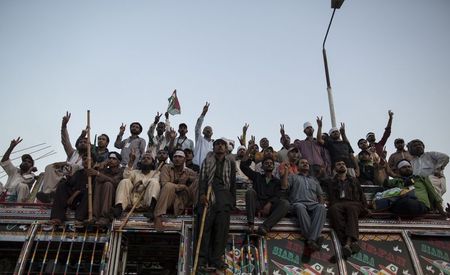By Maria Golovnina
ISLAMABAD (Reuters) - Pakistan slipped deeper into crisis on Thursday after talks between the government and the opposition failed and protesters prepared for what their leaders declared would be a "deciding day" in their bid to bring down the prime minister.
Pakistan has been gripped by mass protests for two weeks, with thousands of demonstrators led by cricketer-turned-politician Imran Khan and firebrand cleric Tahir ul-Qadri camped outside parliament in a country prone to military coups.
In a bid to resolve the standoff, government representatives have held sporadic talks with protest leaders, but the latest round of negotiations ended inconclusively.
Qadri, who has a huge following and runs a network of Islamic schools and hospitals, told his supporters to prepare for a decisive day in their campaign.
"Thursday will be Revolution Day," he told a roaring crowd. "We will not go forward from tomorrow as it will be the deciding day."
Khan has also promised an important statement for Thursday.
Both Qadri and Khan have made many dramatic statements about their intentions since the start of the protests, most of which have not materialised. Several ultimatums have passed without action and Sharif has rejected their call for his resignation.
But the atmosphere in Islamabad, the Pakistani capital, was nervous on Thursday, with security visibly beefed up in the centre of the city.
Dozens of large blue police vans drafted in from all over Pakistan patrolled the central thoroughfare to the protest site.
Pakistan has swung between democracy and military rule for decades and the army's position is key to what happens next.
Although many expect the protests to fizzle out, there is still scope for trouble if events take a more violent course.
The demonstrations come at a difficult time for Pakistan, already plagued by an Islamist insurgency, sectarian tension and recurrent power shortages, with many people deeply unhappy with the government's performance in the past year.
But few expect the army to try to grab power again. So far it has stayed out of the stand-off, providing security for Sharif and key government installations and calling on all sides to show restraint and solve the dispute through political means.
Two weeks since they swept into the area outside parliament, thousands of protesters seem determined to stay on despite the heat and occasional monsoon downpours. The site is now littered with garbage and a putrid smell of human waste hangs in the air.
In a show of defiance, some protesters have dug graves in the capital's Constitution Avenue to show they are prepared to die for their cause.
Khan, an outspoken former cricket hero and Oxford graduate, wants Sharif to step down because he believes the prime minister rigged last year's election. Sharif won the vote by a landslide, taking 190 of the 342 seats in the national assembly.
The ballot was the first democratic transfer of power in Pakistan's history and also propelled Khan from a fringe player to the head of the country's third-largest legislative bloc.

Qadri wants Sharif to step down because he says the system is corrupt. He has promised free housing for the homeless, and welfare and subsidised food and electricity for the poor.
(Additional reporting by Mehreen Zahra-Malik; Writing by Maria Golovnina; Editing by Clarence Fernandez)
